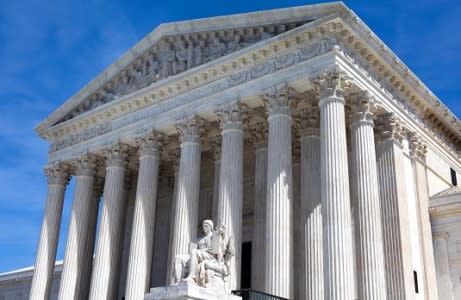Trump team gets early constitutional assignment
The new Trump administration will be in office only 11 days when it must take its first position on a constitutional issue, arising in a major Supreme Court case on prolonged detention of immigrants in prison-like conditions. At the request of both sides in that controversy, the Court has added time to the schedule for filing an extra round of briefs, to answer constitutional questions posed by the Justices.
The facade of the United States Supreme Court building in Washington, D.C.
Given the President-elect’s controversial statements during the election campaign about how to treat immigrants, it is ironic that his legal team must take on this task in its first dealings with the Supreme Court. It probably will get some help on the task from the departing lawyers in the Obama Justice Department, but the Trump administration must make the brief its own. It alone will have the authority to file any government brief by the new deadline – January 31.
It should be stressed that the court did not change the schedule specifically because of the change in administrations in Washington, but the practical reality is that its action shifted responsibility to the Trump team. The original deadline was January 17 – three days before the inauguration. The court acted after lawyers for both sides said they had scheduling conflicts. The changed times were made without any comment.
The pending case, Jennings v. Rodriguez, was under review by the court but only on the meaning of federal immigration law. At issue is whether that set of laws puts a limit of six months on detention of foreign nationals, without giving them a hearing to seek their release. The detention is done to keep the immigrants in custody pending their deportation.
The Justices held a hearing on the case on November 30, and some Justices thought that the dispute actually poses constitutional issues, but no such issues were actually before the court in a technical sense. Last week, the court got over that procedural barrier by simply telling lawyers on both sides to come back with answers to the same detention questions, but the answers are to focus on what the Constitution does or does not require on the scope of detention.
Both sides are to file their answers to those questions by January 31, with replies by both sides due on February 21.
Ordinarily, Supreme Court briefs for the government are prepared and filed by the office of the U.S. Solicitor General. So far, the Trump transition team has not selected the individual to hold that post. Holdover lawyers from the Obama administration almost certainly will try to help bridge the gap, but it is a virtual certainty that they will have to get a sense of what the Trump team wants.
The Obama administration’s lawyers have argued previously that there is no constitutional problem, even with prolonged detention. The Justices, however, apparently were not willing to accept that argument without further input from both sides.
The court has not indicated any plan to hold a new hearing on the case.
Legendary journalist Lyle Denniston is Constitution Daily’s Supreme Court correspondent. Denniston has written for us as a contributor since June 2011 and he has covered the Supreme Court since 1958. His work also appears on lyldenlawnews.com.


